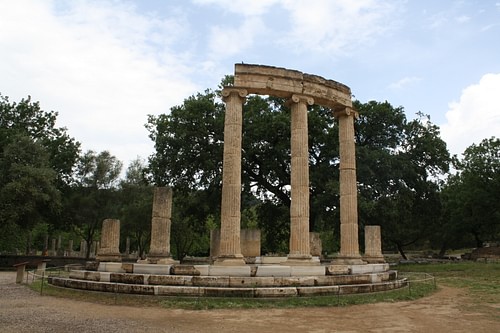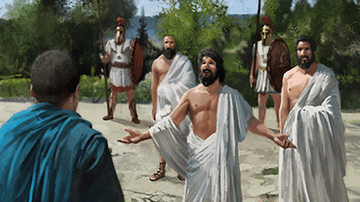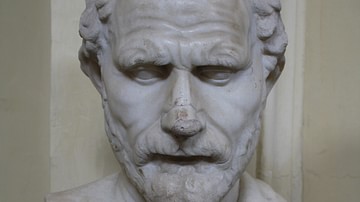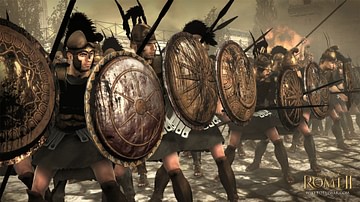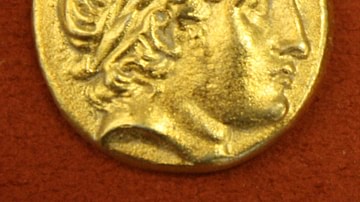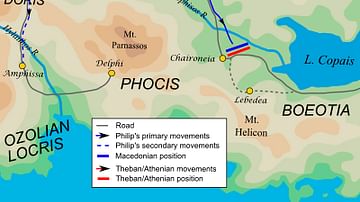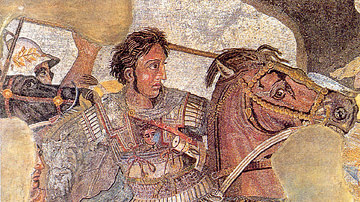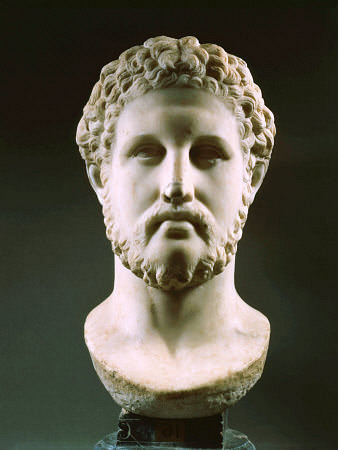
Although he is often only remembered for being the father of Alexander the Great, Philip II of Macedon (reigned 359 BCE - 336 BCE) was an accomplished king and military commander in his own right, setting the stage for his son's victory over Darius III and the conquest of Persia. Philip inherited a weak, backward country with an ineffective, undisciplined army and molded them into a formidable, efficient military force, eventually subduing the territories around Macedonia as well as subjugating most of Greece. He used bribery, warfare, and threats to secure his kingdom. However, without his insight and determination, history would never have heard of Alexander.
Unlike many of the city-states in Greece, Macedonia was a monarchy, seen as primitive and backward by the rest of Greece. Although the people spoke a Greek dialect, many believed the country was useful only as a source of timber and pastureland. The royal family of this barbaric land was the Argeads who traced their roots to both the isle of Argos and Heracles (Hercules), the son of Zeus. Born around 383 BCE, Philip was the youngest of the three sons of Amyntas III. His older brother Perdiccas III was killed while fighting the Illyrians along the northern Macedonian border. Since the oldest Argead brother, Alexander II, was also dead, Philip was made regent for his nephew Amyntas IV. Philip assumed the Macedonian throne for himself at the age of 23 in 359 BCE. His immediate concern was twofold: to safeguard Macedonia's borders and reorganize the army. His major foes were the Illyrians (whom he would eventually defeat in 359 BCE) and the Athenians. who not only possessed nearby gold and silver mines but also supported a pretender to the Macedonian throne. Luckily, since much of Greece was embroiled in a series of civil wars, Philip had time to address Macedonia's most pressing concern.
Philip quickly realized the weaknesses of his country's army and drew upon past experience to mold them into a superb fighting unit. For three years, beginning around 367 BCE, he had been a hostage in Thebes - his brother Perdiccas eventually gained his release - where he witnessed the infamous Sacred Band and the extremely successful Theban wedge, as well as the tactical abilities of their famed commanders Epaminondas and Pelopidas. Using these experiences, he completely reorganized Macedonia's army. He increased its size from 10,000 to 24,000 and enlarged the cavalry from 600 to 3,500. This was no longer an army of citizen-warriors but one of professional soldiers. He created a corps of engineers to develop siege weaponry, namely towers and catapults. To give each man a sense of unity and solidarity, he provided uniforms and required an oath of allegiance to the king: each soldier would no longer be loyal to a particular town or province but faithful only to the king. Next, he restructured the traditional Greek phalanx, providing each individual unit with its own commander, thereby allowing for better communication. Philip changed the principal weaponry from the hoplite spear to the sarissa, an 18 to 20 feet pike; it had the advantage of reaching over the much shorter spears of the opposition. Besides the sarissa, a new helmet, and a redesigned shield, each man possessed a smaller double-edge sword, or xiphos, for close-in-hand fighting.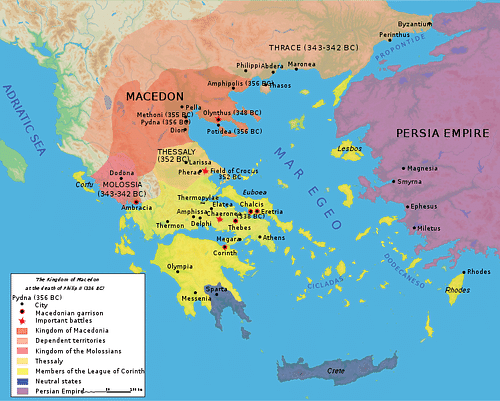
Philip's power would come to fruition when he became involved in the Third Social War in 356 BCE. The Phocians had seized the city of Delphi, home of the famed oracle. Both Athens and Sparta entered the conflict on the side of the Phocians. The Thessalian League asked Philip to help and, although he was initially defeated, he and the Thessalian cavalry crushed the Phocians and their commander Onomarchus at the Battle of Crocus Field in 352 BCE. Although unable to secure alliances against Philip, Athens would continue to wage war until the Peace of Philocrates in 346 BCE. This constant warfare further weakened southern Greece. During this time, Philip expanded his hold on Greece by capturing the cities of Crenides in 355 BCE, a city he renamed Philippi; Methone in 354 BCE which he razed; and Olynthus on the Chalcidice peninsula in 348 BCE. But he did not escape these battles without some personal scars - a lost eye, a broken shoulder, and a crippled leg.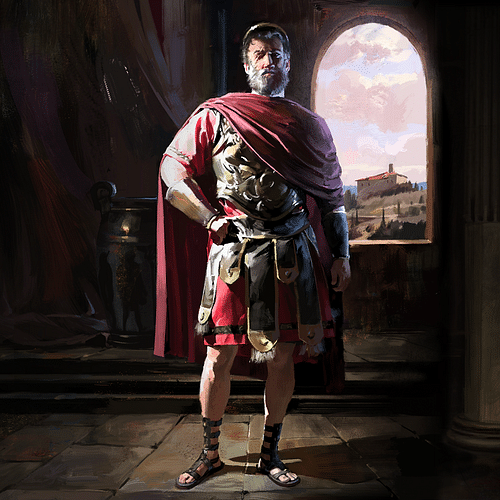
During his conquest of Greece, Philip took time away from the battlefield to marry seven times. The most famous of these marriages was to Olympias, daughter of Neoptolemus of Epirus and mother of the future conqueror of Persia, Alexander (there was also a daughter named Cleopatra). At the time of Alexander's birth in 356 BCE, Philip was away in battle at Potidea. The historian Plutarch in his Life of Alexander wrote of this time, “Just after Philip had taken Potidea, he received three messages at one time, that Parmenio had overthrown the Illyrians in a great battle, that his race-horse had won the course at the Olympic Games, and that his wife had given birth to Alexander ….” However, as Alexander grew and his intelligence became obvious, tension rose between father and son. Because Alexander's mother was from neighboring Epirus, the king was pressured to marry a true Macedonian and provide the country with a pure-blood heir.
In 337 BCE Attalus, a close friend and Macedonian commander, convinced Philip to marry his niece, Cleopatra Eurydice, and provide a more suitable heir. Plutarch wrote, “At the wedding of Cleopatra, whom Philip fell in love with and married, she being much too young for him, her uncle Attalus in his drink desired the Macedonians would implore the gods to give them a lawful successor to the kingdom by his niece.” At the wedding banquet, Alexander became incensed at this idea and voiced his outrage, both at Attalus's comments and his father's drunkenness. Because of his remarks, he and his mother were both temporarily exiled - she in Epirus and he in Illyria. Shortly after his return to Pella, Alexander would be sitting on the throne.
In 336 BCE a former friend and lover of Philip, Pausanias, became angry with Philip over a personal matter and stabbed him to death. Alexander was quickly crowned as the king. Plutarch wrote, “… Pausanias, having had an outrage done to him at the instance of Attalus and Cleopatra, when he found he could get no reparation for his disgrace at Philip's hands, watched his opportunity and murdered him. The guilt of which fact was laid for the most part upon Olympias, who was said to have encouraged and exasperated the enraged youth to revenge …” Olympias' supposed part in the assassination has never been proven; however, it was widely known that she had always wanted the throne for Alexander. Philip's new wife and child were quickly put to death by Olympias, eliminating any significant claimant to the throne. After subduing any serious threats to his rule, Alexander fulfilled his father's dream and invaded Persia.
